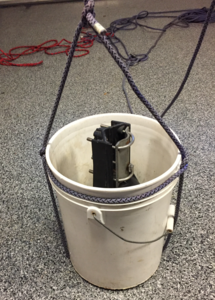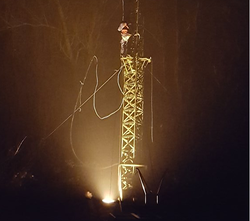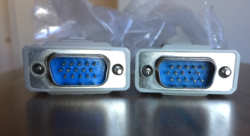 December 14, 2016 Editor: Paul Bourque, N1SFE | ||||
IN THIS ISSUE
The ARRL Rookie Roundup is happening December 18. The mode for this month's roundup is CW. All amateurs are encouraged to participate, but only those licensed 3 years or fewer can submit a log. Logs are due 3 days after the contest's end. The Stew Perry Top Band Distance Challenge is coming up December 17. This grid-based contest has expanded to four sessions yearly, however, the upcoming December event is the most popular. If you have any aspirations to be on 160 meters, this is the weekend to try, as contesters are incented to pull out low power and QRP signals for extra points. Also on the weekend of December 17, the RAC Contest will provide opportunities for Phone and CW contacts from 160 through 2 meters. There's a non-award-eligible distributed multioperator category that might be fun to enter with a group of friends. This time of year, there are plenty of operating events and low-key contests to participate in that have a gimmick or a twist. For example, ARRL Straight Key Night encourages the use of bugs or traditional straight keys. The Bruce Kelly 1929 QSO Party encourages use of equipment from the year 1929, as you might expect from the sponsor being the Antique Wireless Association. QRU BUSTED QSOS John, K9JK, notes that the ARRL 160 Meter Contest logs are due 1600 UTC Tuesday, January 3, 2017, while the ARRL 10 Meter Contest logs are due 0000 UTC Wednesday, January 11, 2017. Complete information for all contests follows the Conversation section December 15 December 16 December 17
December 18 December 19 December 21 December 22 December 23 December 25 December 26 December 28
Ward, N0AX, suggests knowing how to tie the barrel hitch knot. It can replace a missing or weak handle on a five gallon bucket to enable lifting heavy items during tower work. So far for 2016, UK sales of music delivered on vinyl records exceeded sales of digital downloads for the first time ever. DXing on the Edge - The Thrill of 160 Meters, 2nd edition, a book by Jeff Briggs, K1ZM, is now available from DX Engineering, and also available from Array Solutions. Top band contesters will surely find something of interest in this book, which covers practical antennas, Top Band history, and Top Band-specific operating techniques. Jose, CT1BOH, calls the technique used at CR3OO 2BSIQ, or two band synchronized interleaved QSOs. In the video, 17 QSOs are made in 2 minutes, reflecting a rate of approximately 510 QSOs per hour. Jose requests "you hear it with headphones and in a PC in order to fully understand what station is coming from its respective radio, and also read the comments I put in the video to help fully understand it." N3FJP has updated his ARRL 10 Meter Contest Log program to version 5.3, reflecting recent changes to the Mexican section abbreviations. The November 2016 DKARS magazine, published by the Dutch Kingdom Amateur Radio Society, is available on their website. PJ4DX has a retrospective on the 2016 CQWW DX Phone contest, describing the PJ4Q Multi-single operation in comparison with other PJ4 stations in the contest. If you need caffeinated beverage and food suggestions for contest weekends, the Center for Science in the Public Interest has compiled a list of foods and beverages along with their caffeine content. The categories includes coffees, teas, energy beverages, as well as caffeinated snack foods, ice creams and yogurts, chocolate candy and chocolate drinks, and over-the-counter pills containing caffeine. Keep in mind that the Mayo Clinic recommended amount of caffeine is 400 mg per day for adults. Registration is open for the International DX Convention to be held April 21-23, 2017 in Visalia, California. This year's format has been expanded to 3 days, with Contest Academy on the opening Friday. Sequencer A device which arbitrates and controls connections between various pieces of equipment in the receive and transmit signal chains. It is commonly used in UHF/VHF operations where transceivers, transverters, monoband amplifiers, and preamplifiers are used in combination. For example, sequencers are used to make sure that elements of the receive chain such as preamplifiers are switched OUT during transmit, and that all proper transmit components such as amplifiers and filters are switched IN before RF is applied. Modern sequencers are highly configurable, to accommodate complex topologies with varied switching times. Proceedings of the Pacific Northwest VHF Society's 2016 Conference in Bend, Oregon have been posted. Of particular interest to a UHF/VHF contester may be Rick, KK7B's presentation on high-performance Yagi antennas. HamRadio360 Workbench is a series of podcasts around building Amateur Radio gear. It recently featured a community build of an Arduino based antenna analyzer, including design of the PC board, and sourcing of parts.
The PI4COM team had hopes to enter the ARRL 10 Meter contest last weekend, however propagation was not favorable, and instead they put special call signs PA30EUDXF and PF30EUDXF on the air. Sterling, N0SSC, and Marty, KC1CWF, have released the second episode of their Phasing Line podcast. The episode discusses Sweepstakes, operator mentoring at multiops, and working someone with a peanut butter jar antenna. Sterling, 24, is a past ARRL Youth editor, and Marty, 14, is an active contester and promoter of youth radio activities. The final results of the Worked All Europe DX Contest, SSB, are available on the DARC website. Participants are encouraged to share their contest experiences on the WAEDC Facebook page. The WAEDC RTTY Raw scores are also online. There are fewer than 575 days until WRTC 2018. As always, the standings are viewable on the WRTC 2018 website. On-the-fly Macro Modification Consider using the ESCape key during the playback of a CW Macro to shorten it to suit your needs. For example, while running, if my "Thank you" message is "TU N9ADG," I might interrupt it to just send "TU" if I know that there's another caller but didn't get their whole call. Similarly, I could lengthen a "CQ TEST N9ADG" message for the slow times by repeatedly stopping the message after the CQ, and then finally sending the entire message: "CQ" "CQ TEST N9ADG." Backscatter communications is being used by researchers at the University of Washington for ultra-low-power 802.11b Wi-Fi communications. In their scheme, portable low-power devices generate 802.11b signals by receiving an out-of-channel carrier signal, then modulating and mixing the signal so it is transmitted on the desired band. The modulating and mixing steps require much less power relative to the generation of the carrier signal, achieving up to a 10,000-fold reduction in energy consumption. Over-the-horizon radar is an unwelcome intruder into the ham bands. In an example of making lemonade from lemons, Daniel, M0HXM, received and analyzed the waveform of an OTH radar operating near 40 meters to compute the height of ionosphere reflections. He used an IQ recording of the signal, processed by GNU Radio and other open source tools to perform his analysis. He has also improved his analysis in a follow-up article.
While connecting some switchable bandpass filters to a K3, I noticed that the recent batch of Y cables from a vendor were missing a pin compared to the previous order. As this was one of the band inputs, this would have put us off the air for at least a few minutes if we didn't catch it before the contest. Dave, NK7Z, has posted an article on how he is using an SDRPlay SDR to characterize and count the potential RFI sources in his environment. He also points out some tools that are available to help record spectra, and how he interprets the images that he collects. Parts 2 and 3 of his series (yet to be published) promise additional information on how to optimize the display to find particular types of RFI, and then how to find the RFI source using his SDR setup. Contest Relevant The ability to compete in a contest is the result of the coordination of many different tasks requiring many different hard and soft skills. Consequently, there are a lot of possible topic areas in an electronic publication about contesting and many opinions about what topics would be interesting. For each issue of "Contest Update," there's a balance between here-and-now practical contesting topics and interesting little tidbits that may not be immediately helpful in any radio contest. An example of the latter is quantum computing. If and when quantum computing technology become a reality and available at the same cost of a high-end radio, we'll likely see its use as part of improved digital signal processing and coding techniques in our hobby. But we're not going to be using quantum computing technology in contesting in 2017 or 2018. Other topics that today are borderline contest-related could unexpectedly be mainstream in a short period of time. For example, voice recognition delivered via cloud computing may be what enables a usable contest SSB skimmer. Suddenly, scalable computing resources will be part of contest technology discussions. And then there are the topics that are solidly qualified for inclusion, everything from station construction to maintenance of the operator and ethics. Your comments and suggestions regarding the Contest Update are always welcome via the contest_update@arrl.org email address. Happy Holidays! 73, Brian N9ADG DATE An expanded, downloadable version of QST's Contest Corral in PDF format is available. Check the sponsor's website for information on operating time restrictions and other instructions. HF CONTESTS AWA Bruce Kelley 1929 QSO Party, Dec 10, 2300z to Dec 11, 2300z, Dec 17, 2300z to Dec 18, 2300z; CW; Bands: 160, 80, 40m; RST + Name + QTH + Eqpt Year + Transmitter Type (see rules for format); Logs due: see rules. VHF+ CONTESTS See Feld Hell Sprint, ARRL Rookie Roundup, and RAC Winter contests, above. December 15, 2016 December 16, 2016 December 17, 2016 December 18, 2016 December 19, 2016 December 21, 2016 December 24, 2016 December 25, 2016 ARRL Information Click here to advertise in this newsletter, space subject to availability. Your One-Stop Resource for Amateur Radio News and Information ARRL membership includes QST, Amateur Radio's most popular and informative journal, delivered to your mailbox each month. Subscribe to NCJ - the National Contest Journal. Published bimonthly, features articles by top contesters, letters, hints, statistics, scores, NA Sprint and QSO Parties. Subscribe to QEX - A Forum for Communications Experimenters. Published bimonthly, features technical articles, construction projects, columns and other items of interest to radio amateurs and communications professionals. Free of charge to ARRL members: Subscribe to The ARRL Letter (weekly digest of news and information), the ARES E-Letter (monthly public service and emergency communications news), Division and Section news -- and much more! ARRL offers a wide array of products to enhance your enjoyment of Amateur Radio. Visit the site often for new publications, specials and sales. Donate to the fund of your choice -- support programs not funded by member dues! Reprint permission can be obtained by sending e-mail to permission@arrl.org with a description of the material and the reprint publication. ACKNOWLEDGMENTS ARRL Contest Update wishes to acknowledge information from WA7BNM's Contest Calendar and SM3CER's Contest Calendar. | ||||









